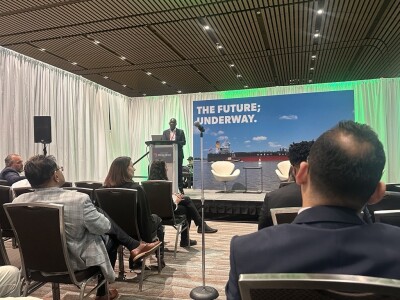While some of the evidence may be only anecdotal, discussions about mariners’ health increasingly focus on the mental as well as the physical.
“The arena of mental health is something the whole industry is picking up on,” said Naomi Walker, spokesman for the Seamen’s Church Institute (SCI), which recently hosted a roundtable on mental health at the International Seafarers Center at Port Newark, N.J., with topics ranging from suicide prevention to medical certificates and a reluctance to report problems for fear of job loss or denial of credentials.
“We were approached by various leaders in the inland river industry concerned about mental health, and they want resources to help combat this problem,” she said. SCI, whose chaplains talk with mariners, created a 40-minute e-learning course on suicide awareness tailored to the inland river. “We’re not really saying they are at more risk than the general population, but we do know there are stressors that can contribute to problems if not addressed. It is an issue, and we want to see what we can do to help.”
Seafarer suicide data, for instance, is incomplete, SCI’s recap of the event noted. “Anecdotal data on United States seafarers in the domestic towboat industry suggest that their suicides occur off-duty at home by self-inflicted gunshots, often within 48 hours before or after deployment to or from their vessel.”
The roundtable concluded that more mental health research is needed. Dr. Rafael Lefkowitz, an assistant professor of occupational and environmental medicine at the Yale School of Medicine, and Dawn Null, an assistant professor of nutrition and dietetics at Southern Illinois University, will be collaborating on a study to learn more about mariners’ health — an issue they’ve both researched.
Not a lot of data exists on who has depression, anxiety or other conditions and what are the barriers to treatment. “People are too shy to talk about their feelings,” Dr. Lefkowitz said. The few mental health cases he’s found “makes us think there are more out there that haven’t been reported. What really sparked his interest was talking with SCI about the inland mariners they’re seeing.
Is there anything unique about mariners’ jobs that might cause problems? “There certainly are some psychosocial hazards,” said Dr. Lefkowitz, who attended the roundtable and whose research is being funded by the Centers for Disease Control (CDC)’s National Institute for Occupational Safety and Health (NIOSH). “Shift work can lead to fatigue and stress, but we also know many of them thrive on such work.” Maybe mariners are just like everyone else, or maybe the isolation on a boat and reluctance to get treatment contributes to problems. “There’s a stigma against mental health.”
So the lesson is it’s hard to learn a lot about mental illness, “because it’s not being reported in the same way as, for example, a broken arm,” he said.
Null is looking at the physical and activity status of mariners, which “also impacts your mental health.” Her 2012 dissertation on the health and nutrition implications of working on a towboat found that crew members are at increased risk of chronic disease related to factors such as lack of aerobic activity and unhealthy eating practices.
“Only 29% of the men and women who participated met federal physical activity guidelines,” she said — that’s 150 minutes of moderate exercise a week. Deckhands, who tend to be younger, were more likely to meet the recommendations.
“The work itself is grueling, as are the shifts,” Null said in the report, which evolved after a stint training towboat cooks on food safety and nutrition. “It’s such a unique industry, and I really enjoyed working with the companies and people on the boats.”
Null and Dr. Lefkowitz plan to survey inland river mariners about their physical and mental health including sleep patterns and health-related behavior off the vessels. They’ll be contacting companies to see if they’ll send the online surveys to their mariners within the next few months. Names, data and companies will not be linked, she said. Results are expected in about a year.
“We’re seeing so many more mental health issues,” she said. “Is there anything we can do to help these men and women lead healthier lives while on the boat?”
SCI roundtable discussions also included key components of mariners’ work — medical certificates — and whether mental illness and related medications are disqualifying and whether certificates are assurances of good mental health.
“Screening for medical conditions, including mental health disorders, should take place during the general medical examination for merchant mariners,” a Coast Guard spokesman said.
Under the psychiatric conditions section, Navigation and Vessel Inspection Circular (NVIC) 04-08 recommends a mental health professional’s report on the status of the condition and medications. Applicants with conditions that don’t “pose significant risk of sudden incapacitation or debilitating complication” may qualify for a certificate, the Coast Guard said. For example, people “with uncomplicated depression are generally found qualified” when a doctor documents that the condition is stable and doesn’t require impairing medication.
“Medications that may be approved for medical certification include over-the-counter and prescription medications that do not impair cognitive ability, judgment or reaction time.”
The Coast Guard also notes, “Since 2014, the number of waivers granted for diagnosed mental health disorders has decreased considerably, from 584 in 2014 to 82 in 2017.”





